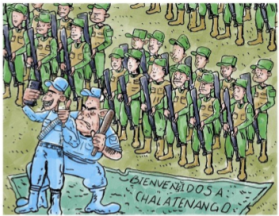Drug Laws and Critiques of US Policy Mark 43rd OAS General Assembly
An evaluation of hemispheric drug policy was the central issue at last week’s 43rd General Assembly of the Organization of American States (OAS), which brought together representatives from 35 nations in Antigua, Guatemala, and marked US Secretary of State John Kerry’s first Latin American visit since assuming office. Social movement groups from across the continent also gathered at the assembly, calling for decriminalization and an end to the US-sponsored War on Drugs.
The summit followed the May 17th release of an OAS-commissioned report recommending the decriminalization and regulation of drug consumption as part of a viable public health strategy in the Americas. This policy shift has earned increased support from Latin American presidents, though President Mauricio Funes has made it clear that decriminalization is not an option for El Salvador.
While no new drug policies were enacted as a result of the OAS discussions, the Assembly broke new ground by breaching the once-taboo subject of legalization. Ultimately, the Declaration signed June 6th called for a “multidisciplinary approach,” and promised to “deepen the debate around a continental policy for the drug problem.” OAS representatives agreed to hold an extraordinary assembly in 2014 to lay the groundwork for the construction of such a strategy for the 2016-2020 period.
The assembly was also the occasion of an announcement by Ecuador, Bolivia, Nicaragua and Venezuela of their imminent withdrawal from the Inter-American Defense Board (IADB), a body charged with advising OAS nations on defense and security policy and strategy. The four nations, all members of the Bolivarian Alliance for the Peoples of Our America (ALBA), denounced the IADB as an instrument of US imperialism in Latin America. “The IADB has turned our Army and police into appendices of U.S. interests and its function is to train people to watch us and control us,” said Ecuador’s Foreign Minister Ricardo Patiño, “We are in UNASUR (the Union of South American Nations), and we are establishing a defense school there, a military training school for our countries.” The move comes as Latin American nations, lead by the ALBA block, are increasingly resistant to the historic US economic and military influence throughout the continent.

 "I am a CISPES supporter because continuing to fight for social justice and a more people-centered country means continuing the dream and sacrifice of thousands of my fellow Salvadorans who died for that vision.” - Padre Carlos, New York City
"I am a CISPES supporter because continuing to fight for social justice and a more people-centered country means continuing the dream and sacrifice of thousands of my fellow Salvadorans who died for that vision.” - Padre Carlos, New York City

